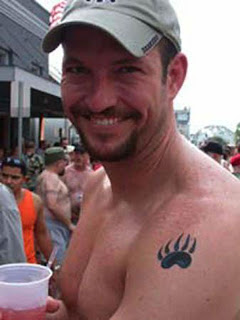Mark Bingham and his mother, Alice Hoagland
I looked back to see what I’d written earlier this week about the 10th anniversary of Sept. 11, 2001, to see if clarity could be added. To write, “I have no idea what the significance was” was both disingenuous and lazy. Of course I have ideas. Everyone does.
Part of the significance probably lies in obvious lessons, things all could agree about: our fragility and extreme vulnerability --- not just to terrorist attacks; the transitory nature of life; the inability of technology to shield us. No matter where we live or who we are. We don’t like to think about that very often.
Most would agree that extremist Islam has proved toxic in this instance and others, but I’d carry it further.
I’m not sure what will happen If Christianity remilitarizes itself, as some now advocate, and that militarism spreads beyond evangelical churches and the Republican party. But it scares me. The church militant always kills.
There’s always the danger, too, that the poison will turn inward; that as that happens, the majority will driven away from it into contempt or indifference; and that the foundations of the elaborate construct we call the church will fracture.
Some days I am so mad at Christians I say to myself, “good!”
I’m fascinated by the theologizing of war, its perceived redemptive power. We didn’t set out to prevent future terrorism, or defuse existing causes 10 years ago. We declared war, set out to exact an eye for an eye, our soldiers holy warriors who, if killed, ascend directly to heaven, occasionally accompanied by their dogs.
I theologize, too, sometimes, but choke on “Onward, Christian Soldiers.”
I look for heroes in the rubble, too. Mine are gay, but you’re welcome to find your own. That wouldn’t be a bad discipline this 10-years-later weekend.
Part of the significance probably lies in obvious lessons, things all could agree about: our fragility and extreme vulnerability --- not just to terrorist attacks; the transitory nature of life; the inability of technology to shield us. No matter where we live or who we are. We don’t like to think about that very often.
Most would agree that extremist Islam has proved toxic in this instance and others, but I’d carry it further.
I’m not sure what will happen If Christianity remilitarizes itself, as some now advocate, and that militarism spreads beyond evangelical churches and the Republican party. But it scares me. The church militant always kills.
There’s always the danger, too, that the poison will turn inward; that as that happens, the majority will driven away from it into contempt or indifference; and that the foundations of the elaborate construct we call the church will fracture.
Some days I am so mad at Christians I say to myself, “good!”
I’m fascinated by the theologizing of war, its perceived redemptive power. We didn’t set out to prevent future terrorism, or defuse existing causes 10 years ago. We declared war, set out to exact an eye for an eye, our soldiers holy warriors who, if killed, ascend directly to heaven, occasionally accompanied by their dogs.
I theologize, too, sometimes, but choke on “Onward, Christian Soldiers.”
I look for heroes in the rubble, too. Mine are gay, but you’re welcome to find your own. That wouldn’t be a bad discipline this 10-years-later weekend.
Mark Bingham, for example, who in everyday life defied every patronizing stereotype used to characterize gay men, then went on to emerge as one of the first genuine heroes of Sept. 11.
At age 31, the head of a successful public relations firm, a stellar athlete, apparently fearless, he was a passenger on hijacked United Airlines Flight 93. After passengers learned during telephone conversations with others on the ground that Flight 93 was in effect a guided missile targeting Washington, D.C., he was among the leaders of a group that stormed the cockpit in an attempt to regain control. As the melee developed, hijackers drove Flight 93 into the ground near Shanksville, Pennsylvania, killing all aboard but sparing hundreds if not thousands in the capital.
“He taught me how to live,” says his mother, Alice Hoagland --- now an activist on several fronts. Here are links to two recent articles about Bingham, one from The Advocate, the other from a Pennsylvania newspaper.
The body of Mychal Judge is carried from the World Trade Center's North Tower.
A Roman Catholic priest, New York Fire Department chaplain, gay, he was characterized in a recent National Public Radio report as “a gregarious, irreverent man wholly devoted to God, whom many considered a saint, in large part because of his own personal struggles.”
Judge ran into the North Tower of the World Trade Center alongside the firefighters he served. Standing near a plate glass window, praying for those whose bodies were falling from the tower to the patio outside, he was killed when the force of the collapsing South Tower shattered the glass and threw him across the room.
Three hundred and forty-three firefighters died that day.
As far as his own death was concerned, "I think he wouldn't have had it any other way," said retired firefighter Craig Monahan. "It was as if he took the lead, all those angels, right through heaven's gates, you know. That's what it seemed like to us. And I guess if any of those guys were confused on the way up, he was there to kind of ease the transition from this life to the next."
There are thousands of other lives to remember on Sunday. Their significance is not so much in how they died, but in how they lived.




No comments:
Post a Comment